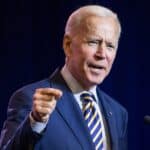



In a recent interview, President-elect Donald Trump announced that he does not intend to replace Federal Reserve Chair Jerome Powell when he assumes office in January, even though their previous interactions have been marked by significant disagreements over interest rate policies.
The New York Post reported that Trump aims to reduce borrowing costs for American families, a goal that could reignite disputes with Powell about managing interest rates.
During an interview on NBC's "Meet the Press with Kristen Welker," Trump was questioned about his position on the possibility of removing Powell.
Trump's response indicated no immediate desire to change the current leadership at the Federal Reserve. This decision is noteworthy given their history of contention during Trump's first term, where he frequently criticized Powell for raising interest rates.
Powell, who was appointed as chair by Trump himself in early 2018, is set to complete his term in 2026. Despite having appointed Powell, Trump has openly challenged the Fed's policies, diverging from presidential tradition by publicly criticizing the central bank.
This practice was particularly evident during the economic uncertainties brought about by rate hikes and the onset of the COVID-19 pandemic.
Looking back to 2018, Trump reportedly considered the possibility of dismissing Powell. His dissatisfaction stemmed from the Fed's decision to incrementally increase interest rates, a move he claimed hampered economic growth. Such tensions escalated as the pandemic unfolded in 2020, with Trump arguing against what he perceived as overly cautious fiscal measures.
Powell has remained resolute in maintaining the statutory independence of the Federal Reserve. Last month, he asserted that dismissing him or any fellow governors before their appointed terms concludes is legally impermissible.
This stance underscores the intricate balance the Fed maintains as it operates under congressional oversight but independent from executive pressures.
Traditionally, U.S. presidents respect the Fed's autonomy due to its critical role in stabilizing the economy. However, Trump's past remarks have suggested he believed he should influence Fed decisions to align with broader economic objectives.
Amidst this backdrop of financial policy debates, market analysts are watching closely as traders anticipate a likelihood of interest rate cuts at the Fed's upcoming policy meeting on December 17-18. This expectation is borne of recent signs of a cooling labor market, which has stoked demand for reduced borrowing costs.
Should the Federal Reserve proceed with lowering rates, the move could potentially bring the policy rate down to a range between 4.25% and 4.50%, a full percentage point beneath its September level. Such adjustments could stimulate economic activity but also stir further complexities in Trump’s interactions with Powell.
Trump's declared focus on minimizing borrowing costs appears to align with a broader strategy to bolster household finances and potentially stimulate economic growth.
However, this ambition might again bring him to odds with Powell, whose approach has historically leaned towards cautious interest rate management.
In the interview with Welker, Trump emphasized his unwillingness to push for Powell's removal, reflecting a possible shift from his previously critical tone.
Despite this, his commentary left room for interpretation regarding the dynamics of their future working relationship.
Observers of U.S. monetary policy will be keenly watching how Trump’s administration plans to interact with the Federal Reserve in the coming years. The associated policies and adjustments will likely have significant ramifications not only for domestic households but also for broader market facets such as employment and inflation.
As Trump transitions back into office, the continuity represented by keeping Powell suggests a complex equilibrium between adhering to existing fiscal frameworks and pursuing reforms aligned with electoral mandates.



